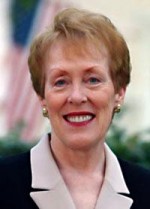USF chooses Castor to run Patel center

Betty Castor is back.
The former USF president and politician has been chosen to lead the Dr. Kiran C. Patel Center for Global Solutions, a new research center that focuses on improving living conditions of the world’s poor.
“I’m excited and very pleased to be back,” Castor said.
Castor, 65, became USF’s first female president in 1995 and served until 1999.
The Center, which received a record donation of $34.5 million in summer 2005 from Drs. Kiran and Pallavi Patel, will operate mostly as a think tank for professors and other experts to research ideas to improve living conditions in places such as Africa and Central America.
Castor will make $197,000 annually and is eligible to earn an 8 percent increase after the end of her first year. She started Tuesday and reports directly to Provost Renu Khator, who was heavily involved in hiring Castor.
Given her ties to USF as well as her global experience, Khator said selecting Castor was a no-brainer.
“We wanted four attributes: understanding of the global context, experience, passion and a drive to achieve,” Khator said. “I can’t think of any person who has more drive than her, along with credibility among academic circles.”
Castor’s international experience is extensive. Before becoming USF president, she served as Florida’s education commissioner, during which she toured Japan’s primary education system, initiated training and exchange programs in Spain, France, Costa Rica and Canada, and traveled to Israel to examine the use of technology in schools.
Following an unsuccessful campaign for the U.S. Senate in 2004, Castor has been working with the Teachers for East Africa program to aid schools and universities in East Africa.
She began her teaching career in Uganda in 1963, where she witnessed firsthand the hardships the Patel Center hopes to eliminate.
“It’s almost like my career has come full circle,” she said.
One of the first tasks the Center will focus on, Castor said, is improving drinking water around the world. USF researchers have already begun investigating water problems in Honduras, the Dominican Republic, Mexico and Kenya. According to the World Water Council, 1.1 billion people worldwide lack access to safe drinking water.
“Global support is the goal,” she said.As far as support for the Center, Khator said, one of the first priorities is to construct an advisory board, as well as increase the endowment, because the initial donation isn’t enough to pay for the construction of the estimated $60 million facility.
“The endowment must grow,” Khator said. “That’s a priority.”
USF proposed a site for the Center on campus near the Alumni Center and hopes to move in by 2008.
Khator and Castor both said the Center will rely heavily on USF professors to come up with solutions to problems around the world.
“There are roughly 70 members of our faculty involved,” Khator said. “We’re going to keep professors very involved. We’re doing a whole lot of things.”Castor said USF should be proud to be home to the Center.
“It’s a great opportunity,” she said, “and it’s an area where the University will be at its best.”






